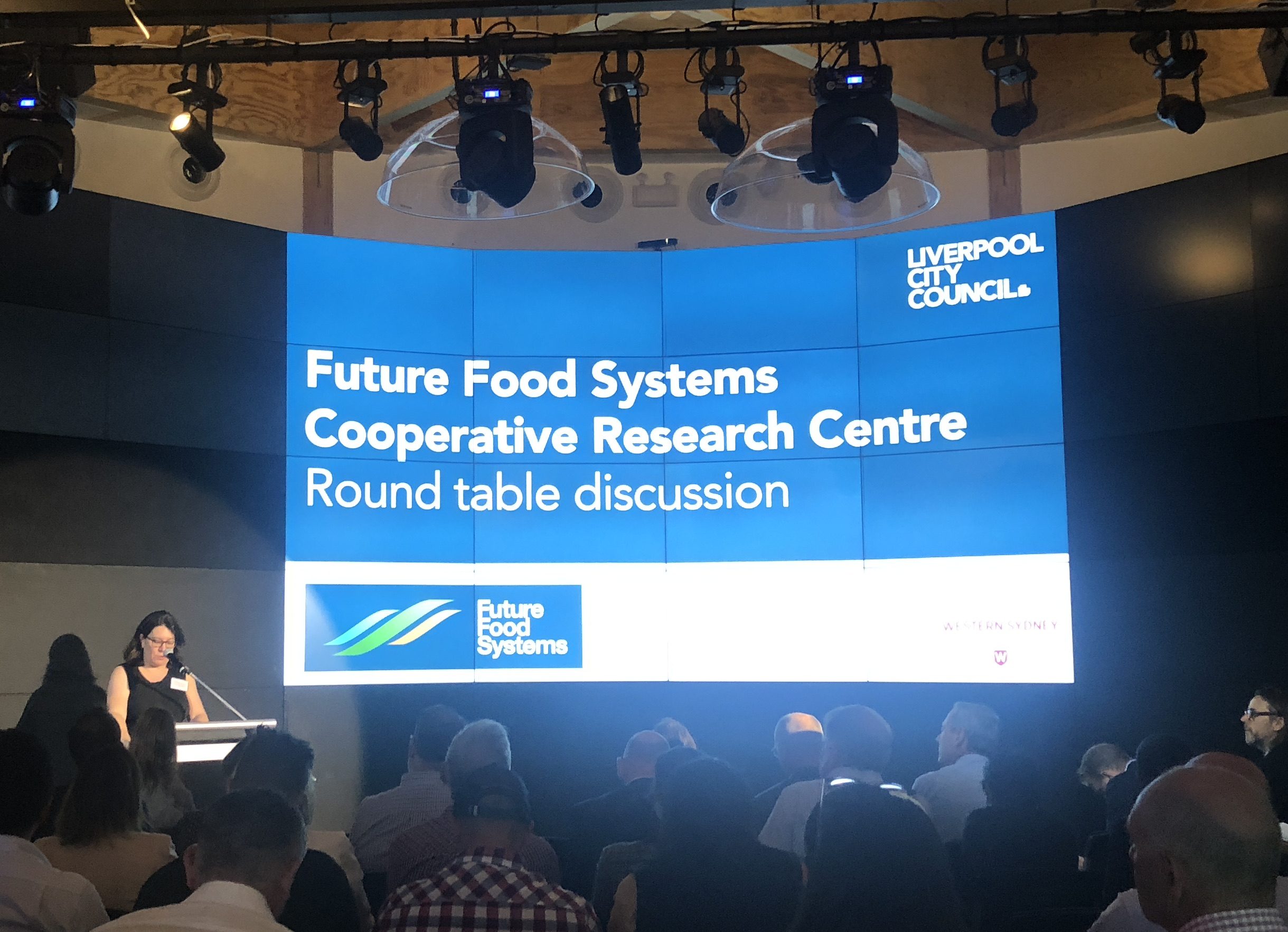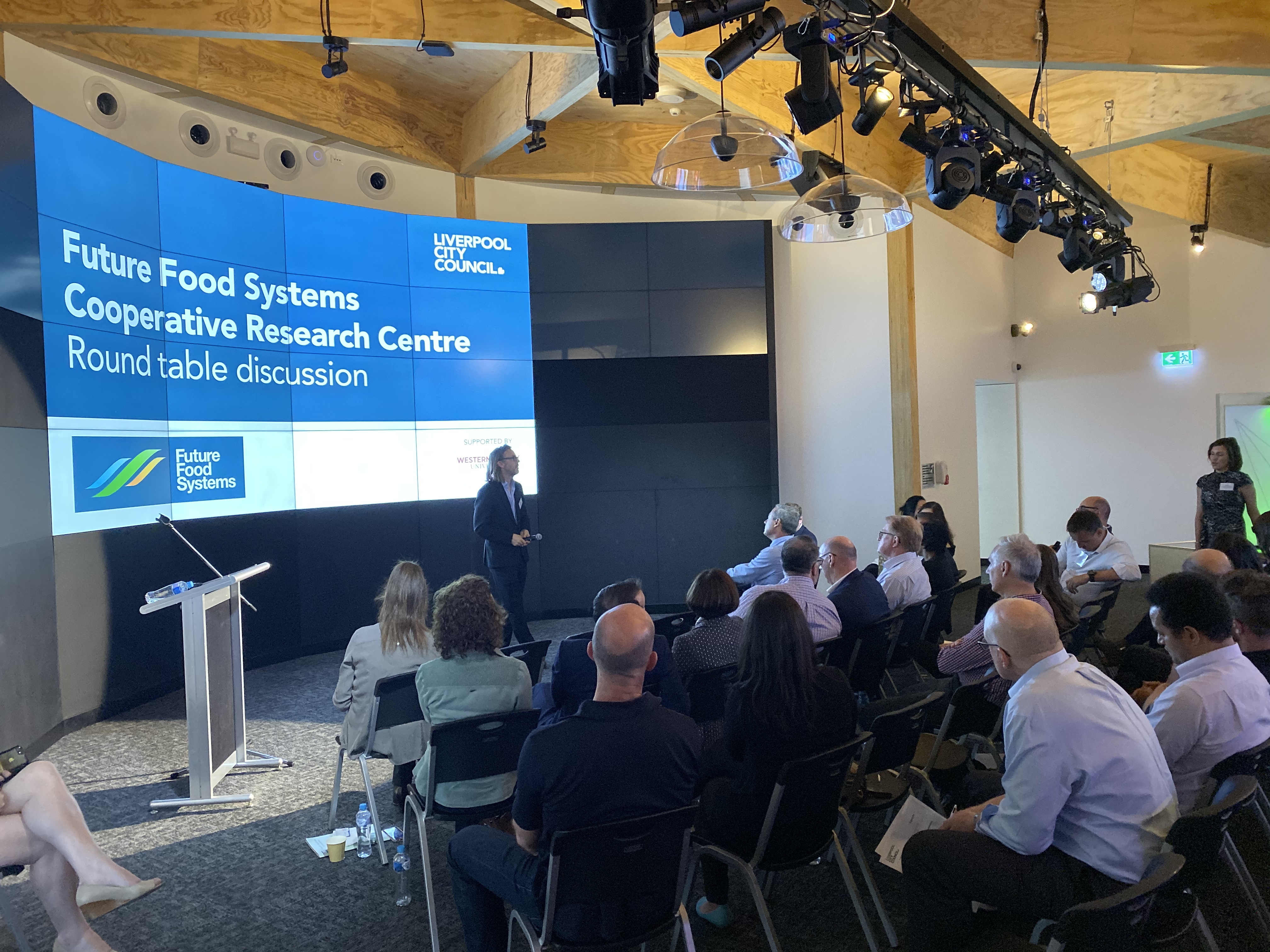On Friday 18 October, Liverpool City Council hosted a meeting of interested stakeholders to discuss Future Food Systems CRC research priorities for the proposed food and agribusiness hub in Western Sydney.
Held at the site of the new Western Sydney Airport, the meeting was attended by a broad range of stakeholders, including major local landholders and representatives of CRC partners, among them Liverpool CC, Queensland University of Technology (QUT), Western Sydney University (WSU), Western City Aerotropolis Authority, NSW Farmers, Costa Group and Escavox.
Liverpool CC CEO Kiersten Fishburn kicked off the proceedings with an overview of the council’s partnership with the CRC, outlining the opportunities this would open for food producers, agribusiness and landowners in the Liverpool region and how Council, the CRC and stakeholders could work together to create a state-of-the-art agribusiness hub adjacent to Sydney’s soon-to-be-built, curfew-free international airport.
David Eyre, CEO, then gave a short introduction to the new Future Food Systems CRC, outlining its scope and goals and how these aligned with the proposed agribusiness hub adjacent to the airport.
This was followed by brief addresses from round-table facilitators Professor Douglas Baker from QUT, head of the CRC’s Research Program One: Food hubs, logistics and trade, and an expert in urban planning and logistics; and Donald McNeill, Professor of Urban and Cultural Geography at WSU.
A round of stakeholder introductions led the way into a productive discussion of the opportunities and challenges inherent in the creation of a successful new agribusiness hub at the airport, and how these might be productively addressed.
 Key themes arising from the roundtable included:
Key themes arising from the roundtable included:
- the immense opportunities for export of food and beverage products presented by the new, curfew-free Western Sydney Airport;
- the importance of transport logistics in creating an efficient agribusiness hub adjacent to the airport;
- the value of tailored spatial mapping in guiding infrastructure development; and
- the need to support local agribusiness and agritourism/food ventures in the planning phases.
Paul Leven from CT Freight and Vince Condello from IFC Global Logistics noted the critical importance of accommodating future transport and logistics needs in today’s infrastructure planning, with QUT-based logistics and spatial mapping expert Professor Douglas Baker offering feedback on how the CRC aims to develop state-of-the-art spatial and logistics scenarios to guide the development of the new precinct.
Another key topic of discussion was the importance of including coalface stakeholders in the planning phases of the agribusiness hub, envisaged as a ‘mosaic landscape’ that accommodates a diversity of land uses and scales of enterprise.
Representatives of small and larger-scale agribusinesses, including Costa Group, Green Camel and Rita’s Farm Produce, were excited by the opportunities offered by the new airport and proposed agribusiness hub but concurred that primary-producer input into infrastructure planning, including the provision of key facilities such as onsite coolrooms, would be crucial to ensuring its efficient operation.
Major local landowners, such as Louise Waterhouse, and representatives of Liverpool area landholder groups were also keen to be included in the planning of the new aerotropolis and proposed agribusiness precinct.
There was some discussion about ways in which local businesses and land might be incorporated into the planning of the Aerotropolis, such as through the creation of a food tourism precinct with accommodation for visitors, regional food and wine outlets, tours of local farms/glasshouse complexes and the like.
Much of the discussion centred on the need for cross sectoral collaboration, with all three tiers of government, industry and research bodies working collaboratively to create an exemplar food hub in the region.
Opportunities for regional specialisation and high value job creation were discussed, including potential for Western Sydney to become a hub for food and medical crossover industries, building on existing local capability. As an example, it was noted that indoor cropping facilities located in a Western Sydney sustainable agrifood precinct could specialise in producing inputs for advanced nutraceutical factories co-located in the precinct.
Participants expressed their willingness to be involved in research to develop a collaborative Food Plan for the region that addresses industry, government and community objectives. Mapping and multi-criteria analysis previously developed by CRC researchers to underpin master planning were shown as examples of how the research team plans to work with local stakeholders to build scenarios for future food industry growth. Landholder and industry attendees expressed their willingness to contribute data to CRC food hub planning analysis.
The workshop concluded with a call to action from Kiersten, resulting in the decision to form a stakeholder’s group.


